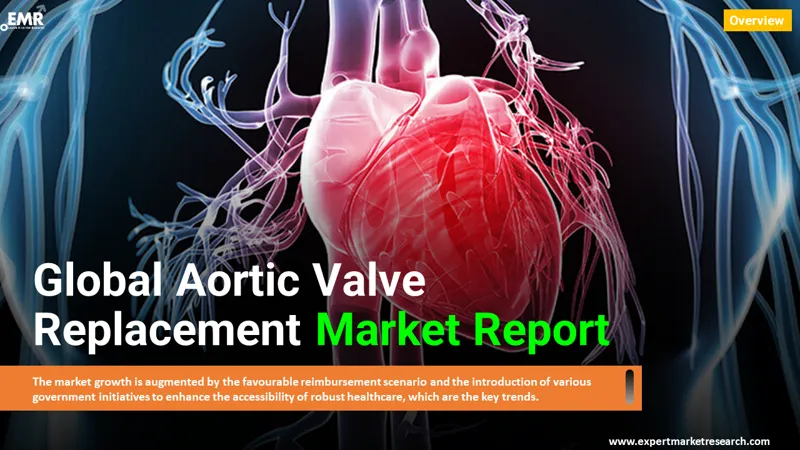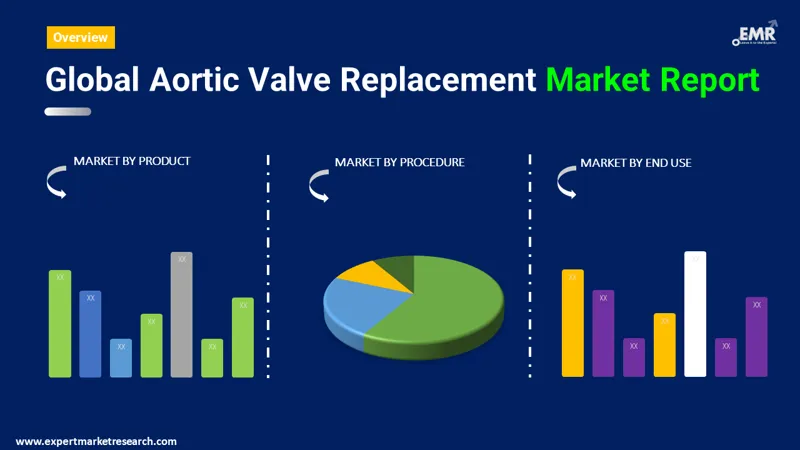
Consumer Insights
Uncover trends and behaviors shaping consumer choices today
Procurement Insights
Optimize your sourcing strategy with key market data
Industry Stats
Stay ahead with the latest trends and market analysis.
The global aortic valve replacement market size was valued at USD 12.57 Billion in 2025, driven by the increasing prevalence of valvular disorders across the globe. The market size is anticipated to grow at a CAGR of 12.10% during the forecast period of 2026-2035 to achieve a value of USD 39.39 Billion by 2035.
Base Year
Historical Period
Forecast Period
Compound Annual Growth Rate
12.1%
Value in USD Billion
2026-2035
*this image is indicative*
In the human heart, there are four valves that control the blood flow in the heart, one of which is aortic valve. Aortic valves also control blood flow in the heart. The left ventricle and the main artery of the body, also known as aorta, are separated by the aortic valve. As the main function of an aortic valve is to control the blood flow in human body, a damaged or disease influenced aortic valve might probably affect the usual blood flow patterns and make it harder for the heart to perform its job of sending blood throughout the human body. In such conditions where aortic valve does not work properly or at all, the aortic valve replacement or aortic valve repairing are the procedures which are suggested and performed by healthcare professionals on the patient’s heart to cure or treat the condition.

Read more about this report - REQUEST FREE SAMPLE COPY IN PDF
Depending on the condition of the aortic valve, the healthcare professional may suggest getting it checked regularly but most of the times the condition requires frequent attention and treatment due to the severe issues in the aortic valve. These issues require instant attention such as surgical procedures that reduce the chances of the risks involved with the underlying condition, which includes high risks of getting a heart attack and stroke, among others. The major conditions that require instant treatment through aortic valve replacement or repairing include aortic valve regurgitation and aortic valve stenosis, among others.
Transcatheter aortic valve replacement (TAVR) is another key procedure which is performed to treat a condition called aortic stenosis. In this procedure, the damaged aortic valve is being replaced with an aortic valve which is made from animal tissues.
The dramatically increasing demand for TAVR is a major trend aiding the growth of the market. Consequently, the governments are putting in efforts and higher investments in the healthcare sector, significantly aiding the aortic valve replacement market development. The increasing research to develop cost-effective structural initiatives to address gaps in access to this crucial surgery is another key factor propelling the growth of the market. The increasing rates of valvular disorders, especially amongst the ageing population, are also providing a significant impetus to the market growth. The increasing technological advancement in the surgical procedure for aortic valve replacement is also influencing the market expansion.

Read more about this report - REQUEST FREE SAMPLE COPY IN PDF
The EMR’s report titled “Aortic Valve Replacement Market Report and Forecast 2026-2035 offers a detailed analysis of the market based on the following segments:
Market Breakup by Product Type
Market Breakup by Procedure
Market Breakup by End User
Market Breakup by Region
The aortic valve replacement is a surgical process which is performed to treat diseased or malfunctioned aortic valve whose main function is to keep the blood flow under control. The global market for aortic valve replacement is growing significantly from the past few years and is expected to keep on growing in coming years as well due to the rising cases of heart diseases globally and lifestyle changes and unhealthy eating habits explicitly. The increasing prevalence of aortic stenosis is a major factor aiding the market growth.
The increasing numbers of heart surgeries worldwide are also contributing to the global aortic valve replacement market expansion. The increasing ageing population is also aiding the market growth as the ageing population is most prone to suffer from several kind of heart diseases. The increasing demand for transcatheter aortic valve replacement (TAVR) is equally intensifying the aortic valve replacement market growth.
North America is leading the global market for aortic valve replacements owing to the developed healthcare sectors, equipped with all the latest technologies and surgeons. The availability of high-end equipment and devices to perform the procedure, along with robust healthcare infrastructure is a major factor supporting the growth of the market.
The key features of the market report include patent analysis, grants analysis, clinical trials analysis, funding and investment analysis, partnerships, and collaborations analysis by the leading key players. The major companies in the market are as follows:




*While we strive to always give you current and accurate information, the numbers depicted on the website are indicative and may differ from the actual numbers in the main report. At Expert Market Research, we aim to bring you the latest insights and trends in the market. Using our analyses and forecasts, stakeholders can understand the market dynamics, navigate challenges, and capitalize on opportunities to make data-driven strategic decisions.*
Get in touch with us for a customized solution tailored to your unique requirements and save upto 35%!
The market attained a value of about USD 12.57 Billion in 2025, driven by the rising prevalence of heart ailments.
The market size is anticipated to grow at a CAGR of 12.10% during the forecast period of 2026-2035 to reach a value of USD 39.39 Billion by 2035.
The major factors aiding the growth of the market include the rapidly rising geriatric population, rising prevalence of heart disorders, and the rapidly rising demand for transcatheter aortic valve replacement.
The decreasing cost of transcatheter aortic valve replacement, which is directly increasing the number of aortic valve replacements globally, is a major trend supporting the market growth.
The major regions of the market include North America, Europe, Asia Pacific, Latin America, Middle East and Africa. North America has been leading the global market.
The different products in the market are valve type, suture type, and sheet hydrogel. Valve type is further divided into tissue/biological and mechanical. Suture type is further divided into sutured and sutureless.
Procedures followed in aortic valve replacement procedure include minimally invasive, transfemoral aortic valve replacement (TF-AVR), transcatheter aortic valve replacement (TAVR), and open surgery, among others.
The end users in the market include hospitals and ambulatory surgical centres, among others.
Key players involved in the market are Medtronic Plc., LivaNova PLC, CryoLife, Inc., Edwards Lifesciences Corporation, Micro Interventional Devices, Meril Life Sciences Pvt. Ltd., JenaValve Technology, Inc., Auto Tissue Berlin GmbH, Abbott, and TTK HealthCare.
Explore our key highlights of the report and gain a concise overview of key findings, trends, and actionable insights that will empower your strategic decisions.
| REPORT FEATURES | DETAILS |
| Base Year | 2025 |
| Historical Period | 2019-2025 |
| Forecast Period | 2026-2035 |
| Scope of the Report |
Historical and Forecast Trends, Industry Drivers and Constraints, Historical and
|
| Breakup by Product |
|
| Breakup by Procedure |
|
| Breakup by End User |
|
| Breakup by Region |
|
| Market Dynamics |
|
| Supplier Landscape |
|
| Companies Covered |
|
Datasheet
One User
USD 3,299
USD 2,969
tax inclusive*
Single User License
One User
USD 5,499
USD 4,949
tax inclusive*
Five User License
Five User
USD 6,999
USD 5,949
tax inclusive*
Corporate License
Unlimited Users
USD 8,199
USD 6,969
tax inclusive*
*Please note that the prices mentioned below are starting prices for each bundle type. Kindly contact our team for further details.*
Flash Bundle
Small Business Bundle
Growth Bundle
Enterprise Bundle
*Please note that the prices mentioned below are starting prices for each bundle type. Kindly contact our team for further details.*
Flash Bundle
Number of Reports: 3
20%
tax inclusive*
Small Business Bundle
Number of Reports: 5
25%
tax inclusive*
Growth Bundle
Number of Reports: 8
30%
tax inclusive*
Enterprise Bundle
Number of Reports: 10
35%
tax inclusive*
How To Order

Select License Type
Choose the right license for your needs and access rights.

Click on ‘Buy Now’
Add the report to your cart with one click and proceed to register.

Select Mode of Payment
Choose a payment option for a secure checkout. You will be redirected accordingly.
Strategic Solutions for Informed Decision-Making
Gain insights to stay ahead and seize opportunities.

Get insights & trends for a competitive edge.

Track prices with detailed trend reports.

Analyse trade data for supply chain insights.

Leverage cost reports for smart savings

Enhance supply chain with partnerships.

Connect For More Information
Our expert team of analysts will offer full support and resolve any queries regarding the report, before and after the purchase.
Our expert team of analysts will offer full support and resolve any queries regarding the report, before and after the purchase.
We employ meticulous research methods, blending advanced analytics and expert insights to deliver accurate, actionable industry intelligence, staying ahead of competitors.
Our skilled analysts offer unparalleled competitive advantage with detailed insights on current and emerging markets, ensuring your strategic edge.
We offer an in-depth yet simplified presentation of industry insights and analysis to meet your specific requirements effectively.
Share